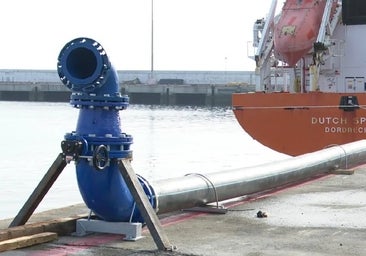Costa del Sol towns enable contingency fund to cover extra costs of shipping in water by tanker
The scheme "to save the summer", under study as part of an emergency plan, is being examined by municipalities along the coast of Malaga province
Jesús Hinojosa
Malaga
Sunday, 17 December 2023, 20:19
The associations of municipalities along Costa del Sol in Malaga province are already considering the option of using water brought in by ship if the drought situation persists this winter.
This has been confirmed to SUR by the heads of the public consortia on the western and eastern coasts, who do not rule out having to make use of this extreme option. Financial studies are already under way for the extraordinary expenses involved, including the carrying out of some works to adapt the current water supply network.
Manuel Cardeña, the president of the public consortium that runs some shared services on behalf of different councils on the western coast, explained that, as part of the drought emergency plan being drawn up by the public company Acosol, "the possible use of water transported by ship is being evaluated".
"The technical team that is drawing up this emergency plan is analysing which ports could be used to receive the tankers and if it is necessary to carry out works or adapt the current supply network to be able to channel this extraordinary supply," Cardeña said. The official added that he is confident that this plan will be ready "before the end of the year".
Ten million euros per month
Supplying water by ships could involve an expenditure of some ten million euros per month for the entire Costa del Sol, according to the Junta's regional minister of Agriculture, Fisheries, Water and Rural Development, Carmen Crespo. Cardeña said that his body is already analysing the necessary budgetary reserves. "Acosol would have to assume this expense, and for this there is a contingency fund, all of which is being studied," said Manuel Cardeña, who remarked that this option is a last resort option if the drought situation persists until March or April.
Cardeña said: "We are looking at what work would have to be done to adapt the current water network for the possible arrival of water by ship, and the possible locations for injecting this supply." Cardeña added that if the drought extends into the spring "measures will have to be taken which are already being studied in the emergency plan and which not only contemplate the use of water transported by boat, but also other actions to extend the exploitation of well resources, for example".
The president of the association of municipalities on the eastern coast, Jorge Martín, is aware that the water shortage situation could become even more acute and make it necessary to use boats for supply. "We hope that it will not be necessary, but Malaga Port will be adapted for this and, when the time comes, we will have to make use of this system, we are already evaluating it," Martín said. He pointed out that this water ship supply would have to be made through the contributions that the Malaga city municipal water company, Emasa, makes to the municipalities of the Axarquía region, at a cost of 7.74 cents per cubic metre of water, as was agreed at the end of November.
Save the summer
This amount is passed on by the public company Axaragua, to the local councils in the area, who must decide whether to include it in residents' bills. On average, this would mean increases of 15-20 per cent in the cost of water for the municipalities in the eastern part of Malaga province.
"We would have to assume this as we have done with the contributions that Malaga city is making," said Martín. However, Martín said that is confident that such an extreme situation will not transpire.
"With the prefabricated desalination plant that the Junta is going to install in El Trapiche and the measures that are contemplated in the next drought decree of the Junta, I am confident that we can save the summer.”



Comentar es una ventaja exclusiva para registrados
¿Ya eres registrado?
Inicia sesiónNecesitas ser suscriptor para poder votar.